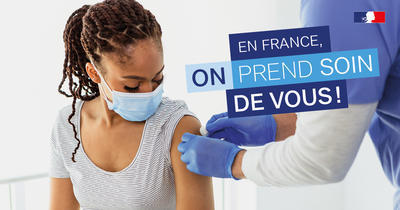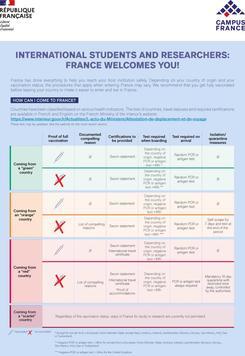
Travel to France: information for international students and researchers
Despite the coronavirus pandemic, France continues to welcome international students and researchers. Depending on the country and the vaccination status, the procedures required to enter French territory vary.
Update - 27 January 2022
France has done everything to let you join your institution safely at the start of the academic year. Depending on the country and the vaccination status, the procedures required to enter the French territory vary. We recommend to fully vaccinate before your departure to facilitate your arrival and everyday life in France.
Vaccines accepted to come to France
Vaccines accepted to come to France are the same as the vaccines approved by the European Medicine Agency (EMA) (Comirnaty/Pfizer, Moderna, Vaxveria/AstraZeneca, Janssen) and the foreign vaccines similar to those accepted in Europe (Covishield, R- COVI, Fiocruz, etc.)
Get fully vaccinated before your departure with a vaccine approved by France.
If you are unable to do so, you will be offered vaccination as soon as possible on arrival, in conjunction with the Social Security and your host establishment, particularly if you come from a country in a red zone.
How can I come to France?
Categories of countries have been defined on the basis of health indicators.
-
“Green” countries: countries without active circulation of the virus and variants of concern
-
“Orange” countries: countries where the virus is actively circulating but in controlled proportions, without the spread of variants of concern.
-
“Red” countries: countries with active circulation of the virus, and variants of concern.
-
“Scarlet” countries: countries in which particularly active circulation of the virus and the discovery of a variant likely to present an increased risk are observed. To date, there are no countries classified as "scarlet red".
The list of countries, travel conditions, and sworn declarations to provide in order to travel are available in French and English on the Ministry of the Interior website:
These lists are updated on a weekly basis. Check out the latest version on the Ministry of the Interior website
ARRIVALS FROM “GREEN” COUNTRIES
Foreign students and researchers coming to France from “green” countries may enter France without restriction.
The list of “green” countries, travel conditions, and sworn declarations to provide in order to travel are available in French and English on the Ministry of the Interior website:
You are vaccinated
At boarding and after landing in France, you must provide:
-
a proof of vaccination: proof of complete vaccination with the necessary doses, carried out 28 days after the administration of one dose for the Janssen vaccine and 7 days after the administration of a second dose for the other vaccines.
-
a sworn declaration: proof that you do not show symptoms of Covid-19 and you have not met anyone with Covid-19, and that you accept to be tested at your arrival.
-
A negative PCR or antigenic test dated from less than 48 hours, unless you are coming from a Member State of the European Union, Andorra, Iceland, Liechtenstein, Monaco, Norway, San Marino, Vatican City or Switzerland.
You are not vaccinated
At boarding and after landing in France, you must provide:
-
a negative PCR test dated from less than 48 days before departure*.
-
a sworn declaration: proof that you do not show symptoms of Covid-19 and you have not met anyone with Covid-19 over the 14 days before departure, and that you accept to be tested at your arrival.
* negative PCR or antigenic test < 24 hours for the following countries: European Union (EU) Member States, Andorra, Iceland, Liechtenstein, Monaco, Norway, San Marino, Vatican City, Switzerland.
ARRIVALS FROM “ORANGE” COUNTRIES
Vaccinated students and researchers coming to France from “orange” countries may enter France without restriction. Non-vaccinated students and researchers coming from “orange” countries must prove a compelling reason to come to France.
The list of “orange” countries, travel conditions, and sworn declarations to provide in order to travel are available in French and English on the Ministry of the Interior website.
You are vaccinated
At boarding and after landing in France, you must provide:
-
a proof of vaccination: proof of complete vaccination with the necessary doses, carried out 28 days after the administration of one dose for the Janssen vaccine and 7 days after the administration of a second dose for the other vaccines.
-
a sworn declaration: proof that you do not show symptoms of Covid-19 and you have not met anyone with Covid-19, and that you accept to be tested at your arrival.
-
a negative PCR or antigenic test dated from less than 48 days.
You are not vaccinated
At boarding and after landing in France, you must provide:
-
A negative PCR test dated from less than 48 hours before departure*.
-
a sworn declaration: proof that you do not show symptoms of Covid-19 and you have not met anyone with Covid. It also allows you to certify that you agree to be tested on arrival and that you undertake to respect a self-isolation period of 7 days.
-
An exempted international travel certificate: a certificate to prove that your travel to France has a compelling reason. This certificate must include documentation to prove the compelling reason.
*A negative PCR or antigenic test < 24h hours for the United Kingdom.
List of compelling reasons for “orange” countries
-
Students registered in FLE class (French as Foreign Language) prior to a registration in higher education;
-
Students admitted to oral exam of entry exams in French higher education institutions;
-
Students registered in a higher education institution for the academic year 2021-2022 (including FLE);
-
Researchers or teachers (including language assistants) settling in France at the invitation of a research laboratory or a higher education institution, for research or teaching activities imperatively needing physical presence, and their spouse (married, “pacs” contract, partner upon presentation of a proof of joint living) and their children.
ARRIVALS FROM “RED” COUNTRIES
Vaccinated students and researchers coming to France from “red” countries may enter France without restriction. Non-vaccinated students and researchers coming from “red” countries must prove a compelling reason to come to France.
The list of “red” countries, travel conditions, and sworn declarations to provide in order to travel are available in French and English on the Ministry of the Interior website.
You are vaccinated
At boarding and after landing in France, you must provide:
- a proof of vaccination: proof of complete vaccination with the necessary doses, carried out 28 days after the administration of one dose for the Janssen vaccine and 7 days after the administration of a second dose for the other vaccines.
- a sworn declaration: proof that you do not show symptoms of Covid-19 and you have not met anyone with Covid-19, and that you accept to be tested at your arrival.
- A negative PCR or antigenic test dated from less than 48 days.
You are not vaccinated
At boarding and after landing in France, you must provide:
-
a negative PCR or antigenic test dated from less than 48 hours before departure.
-
a sworn declaration: proof that you do not show symptoms of Covid-19 and you have not met anyone with Covid. It also allows you to certify that you agree to be tested on arrival and that you undertake to respect an isolation period of 10 days. This isolation period is mandatory, and supervised by authorities.
-
an exempted international travel certificate: a certificate to prove that your travel to France has a compelling reason. This certificate must include documentation to prove the compelling reason.
-
a proof of accommodation: a certificate proving the full address of your accommodation at your arrival in France.
List of compelling reasons for “red” countries
-
Students registered in FLE class (French as Foreign Language) prior to a registration in higher education;
-
Students admitted to oral exam of entry exams in French higher education institutions;
-
Students registered in a higher education institution for the academic year 2021-2022 (including FLE);
-
Researchers or teachers (including language assistants) settling in France at the invitation of a research laboratory or a higher education institution, for research or teaching activities imperatively needing physical presence, and their spouse (married, “pacs” contract, partner upon presentation of a proof of joint living) and their children.
ARRIVALS FROM “SCARLET” COUNTRIES
Whether you are vaccinated or not, you must comply with the compelling reason system. Students and researchers are not included in the list of travellers who are authorised to show a compelling reason to come to France.

Prepare your arrival in France
Social security
In order to benefit from the French health system, you must register to the “Sécurité Sociale” (social security).
Students coming from a “red” country must join the social security system before coming to France. They will be able to get a vaccination slot more quickly if they are not vaccinated.
Students from all other countries must register when they arrive in France.
To register for social security, go to: https://etudiant-etranger.ameli.fr/
How to register to the “Sécurité Sociale” from your country?
This exemption is only possible for students coming from “red” countries.
You will be able to register with the French social security system from your country of origin in order to benefit from health insurance coverage at your arrival in France and to have easier access to vaccination.
Login as soon as possible to the website: https://etudiant-etranger.ameli.fr/
Enter the required information just as if you were already on the French territory.
If you do not have your final school certificate, your admission certificate will be accepted for your membership instead. All the other documents requested are compulsory.
You will have to finalize this affiliation once in France by sending your school certificate to the Caisse primaire d’assurance maladie (Sickness Insurance Primary Fund). This will enable you to get a vaccination slot more quickly if you are not vaccinated.
To help you with these procedures, consult the Health Insurance tutorial
https://www.campusfrance.org/system/files/medias/documents/2021-08/Tuto…
The vaccine pass
In France, a vaccine pass is required to access sepcific places : bars and restaurants, entertainment and cultures places, long distance transports (plane, train, bus).
The vaccine pass consists of the presentation a health proof in digital (using the TousAntiCovid app) or paper format of three types:
-
A vaccination certificate: a proof that you have a complete vaccination scheme, with the booster dose done on time for people over 18 years old.
-
A certificate of recovery: proof that you have been cured of Covid-19 for more than 11 days and less than six months;
-
A proof of medical contraindication to vaccination for those affected.
You were vaccinated in one of the following countries: European Union (EU) Member States, Albania, Andorra, the Faroe Islands, Iceland, Liechtenstein, North Macedonia, Moldavia, Monaco, Montenegro, Norway, the United Kingdom, Serbia, Switzerland, Ukraine, San Marino, the Vatican, Armenia, Cape Verde, Israel, Lebanon, Morocco, New Zealand, Panama, Singapore, Taiwan, Turkey, United Arab Emirates, and Uruguay. The COVID certificate issued in these countries is accepted in France.
If you were vaccinated outside these countries, you may require a vaccine equivalency pass online. You will obtain a QR code for the vaccine certificate of equivalence.
Online application for a student vaccine equivalency pass
Isolation and accommodation
If you have to observe a period of isolation on arrival:
-
Stay at home as much as possible
-
Keep contacts to a minimum
-
Wear a mask if you share your accommodation
-
Monitor your temperature
-
Report any symptoms to a doctor immediately
-
Inform your host in advance so that he/she can take the appropriate measures (disinfection, etc.).
For unvaccinated people coming from “red” countries, this isolation is mandatory and controlled by the health authorities.
Visa
Validate your long-stay visa used as residence permit (VLS-TS) at your arrival on the platform of the Ministry of the Interior.
Login to: https://administration-etrangers-en-france.interieur.gouv.fr/
This simple and quick procedure guarantees you a regular stay in France to continue your study or research project.
France Alumni
Join France Alumni, the worldwide network of international graduates from French higher education to enrich your experience in France.
Additional recommendations
When you arrive in France, we also recommend that you:
-
Wear a mask in closed spaces (and outside where required)
-
Follow the official information from the French government
-
Download the TousAntiCovid government application
-
Contact your host institution for distance support about your reception and course.
-
Immediately contact a doctor in case of symptoms
Recommended News















